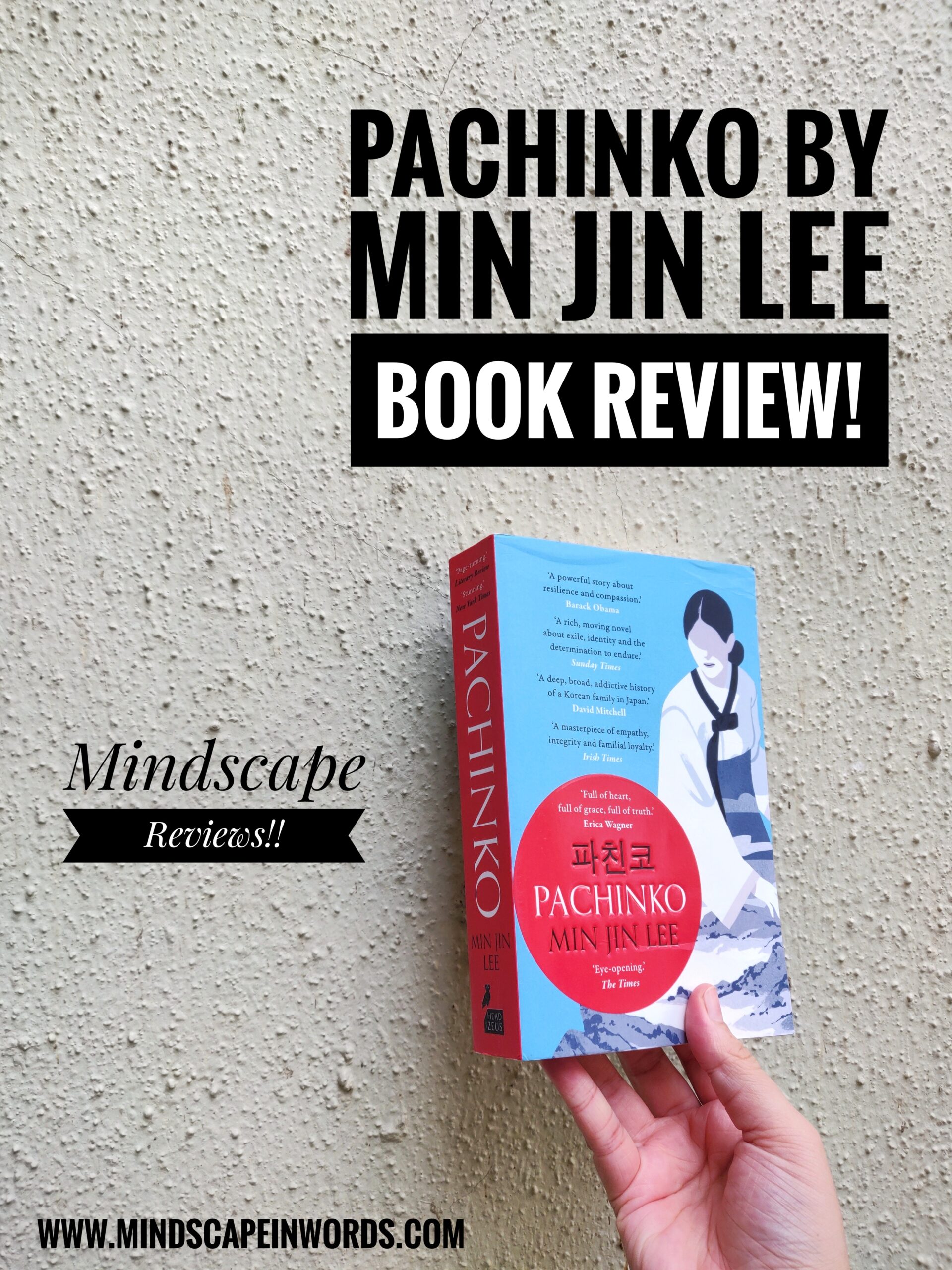Pachinko by Min Jin Lee Book Review!

Hi Readers! I completed Min Jin Lee’s Pachinko a week ago. I am still processing all the beauty, courage & humanity of the story. After a point, there was just so much to uncover in it. I found myself scribbling down bizarre notes randomly, in no sequence or relation to other notes. I had to capture my thoughts & write them down so many times while reading this. And, that in itself says a lot about the book. From Korean & Japanese people’s biases to the unravelling of characters of a family for over 100 years to the importance of mental health & self-identity to bonds created by blood & love. Pachinko is an inspiring story, as unique as its characters & as common as the locals. It took my breath away & days later, I am still here pondering of the magnificence of it.
This review is going to be long, so brace yourselves. And, it also includes spoilers.
~~GOODREADS DESCRIPTION~~
In the early 1900s, teenaged Sunja, the adored daughter of a crippled fisherman, falls for a wealthy stranger at the seashore near her home in Korea. He promises her the world, but when she discovers she is pregnant — and that her lover is married — she refuses to be bought. Instead, she accepts an offer of marriage from a gentle, sickly minister passing through on his way to Japan. But her decision to abandon her home, and to reject her son’s powerful father, sets off a dramatic saga that will echo down through the generations.
Richly told and profoundly moving, Pachinko is a story of love, sacrifice, ambition, and loyalty. From bustling street markets to the halls of Japan’s finest universities to the pachinko parlors of the criminal underworld, Lee’s complex and passionate characters — strong, stubborn women, devoted sisters and sons, fathers shaken by moral crisis — survive and thrive against the indifferent arc of history.

~~THOUGHTS~~
I have way too many thoughts about this novel. Some can be categorized & grouped, while others are just multitudes of standalone ones. I have tried my best to capture them & present them here.
~~CHARACTERS~~
Because the story spans 100 years, there are a lot of characters. To put it simply it starts with Hoonie, his daughter Sunja, her sons Noa & Mozasu, Noa’s children & Mosazu’s son Solomon. With the combination of so many characters & brilliant story writing, it felt like I was robbed of a good 200 pages. I felt that for this book should have been 700 pages long because there was so much to cover with all these characters which the reader entirely adores. On the other hand, it also could have been about 400 pages but with one less character story. I cannot choose which character could be erased, which is why I would’ve happily read 200 more pages on a journey with these characters. All the characters are entirely fascinating & come alive because of the captivating writing. Right from Sunja’s father’s story to her grandchildren’s story, it’s a rollercoaster. These characters hold the reader’s attention & make the reader root for them all.
What I also loved about these characters is that though some of them are tied by blood, many of them are strongly tied by love. Someone is connected to someone else & these connections are so underrated in the novel. This is exactly why I found these ties to be brilliantly formed & executed throughout the novel. For example, Kyunghee & Yoseb couldn’t have kids but in a way Noa & Mozasu were like their kids. And because Noa & Mozasu’s father died, Yoseb was sort of like the fatherly figure for them. Solomon’s mom Yumi dies but then Mozasu’s girlfriend Etsuko becomes a motherly figure to him. Haruki’s wife couldn’t have kids, so her husband’s mentally ill younger brother becomes like her own child. It’s such an amazing feeling to see these bonds that go above blood.
Also, the way Noa’s birth father was Hansu, but he always followed the footsteps of Isak Baek. And, on the other side, Mozasu’s birth father was Isak, but he kind of followed the footsteps of Hansu. Watching these characters unravel within other characters’ stories was nothing less than a magical experience.

~~WRITING STYLE~~
The book is divided into 3 parts. Book 1: Gohyang/Hometown (1910 to 1933) lasts for 23 years giving us Sunja’s story from before her birth until she becomes a mother herself. Book 2: Motherland (1939 to 1962) also lasts 23 years & as the title suggests is all about Sunja’s motherhood to her children Noa & Mozasu. It also reflects upon her life in Japan. Book 3: Pachinko (1962 to 1989) lasts 29 years focusing mainly on the lives of Mozasu & a little bit of Noa.
I felt that the first part was unnecessarily dragged. I know it was important to tell us about Sunja’s parents, her childhood & so on, but it could have easily been shortened. What could’ve been shortened here, could’ve been expanded in the latter 2 parts, which flew by very quickly. In Book 2, where everything was actually happening, the writing felt rushed. Yes, the pace was faster, but it felt like I was rushed out of my own head’s movie theater. This part was only 30 pages longer than the first part, but covered a large amount of the story. And lastly, Book 3 was pretty perfect. There were a few characters I did not care about, but after finishing the novel you understand that all those characters are tiny pieces of a jigsaw puzzle. Everything fits beautifully after all.
Book 2 & Book 3 had many time jumps, which is obvious when you are reading about 100 years of story in 530 pages. When there’s even a 2-year time jump, you are left wondering about what happened to those characters in that time? Who did they meet? How were they doing? Did they miss their home? Did they fall in love? How did they know that they had met their soul mates? I can’t decide whether to blame the author for keeping those parts from me, or to give her a medal for making me care about these characters so deeply.
I think because it is written like this, you never know what to expect. You cannot possibly know what the characters feel. This unpredictability could literally lead to anything. After another time jump, they could be single or married or divorced or widowed or dead. The bond which readers have with these characters stems from their history & where they have come from rather than the emotional bonding. And, in this sense, the author again baffled me because at the end of it I am the one who is in a sea of emotions!
In the present time while reading, it seems just one word after the other in quite a monotonous manner, but when you look back at it you understand the beauty of the journey in the form of compassion, love, empathy, peace & hope.

~~HISTORICAL FICTION~~
Historical fiction is my favourite genre & I have read many books from this genre. There are a lot of historical fiction novels with female spies & bakers & book thieves & so much more. But all those books talk about WWII & its impact on Europe or USA. But, this is the only novel I know which has shown the war’s impact on the people of Korea & Japan. There might be more books set in Asia which I am not aware of, but Pachinko is easily the most popular one. Pachinko even goes one step further to show us how the war’s effects have reverberated through so many generations of a family. This is an important book & it speaks volumes by staying true to the people of Korea & Japan.
~~MENTAL HEALTH~~
In a very subtle manner, the book has thrown light on how war, bullying & loss of an identity can lead to mental health problems. There are many examples in the book stating this. There are Mozasu & his friend Haruki who were bullied in high school. They had suicidal thoughts at the time & even after growing up those thoughts persisted for Haruki. And then there’s Noa, who is an ideal child until everything disrupts his life. He loses his sense of self & has a life-long trauma after finding out about his real birth father who was not a nice man. The deep-seated trauma for each of them comes to the surface to show us how important it is to take care of yourself.

~~TO READ OR NOT TO READ~~
Pachinko is hands-down one of the most beautiful, intricate & immersive work of fiction I have ever read. There are not many downsides to reading it, but I should tell you that there are some trigger warnings you should watch out for before reading Pachinko. The novel has instance of bullying, suicide, substance abuse & a few more. But, the way it is written, the intensity of the issue is not screaming horrified in our faces. It’s mellow, to the point while also conveying a message. Pachinko is a book recommendation I will always recommend. I have rated it at 5/5 stars!
Until next time,
